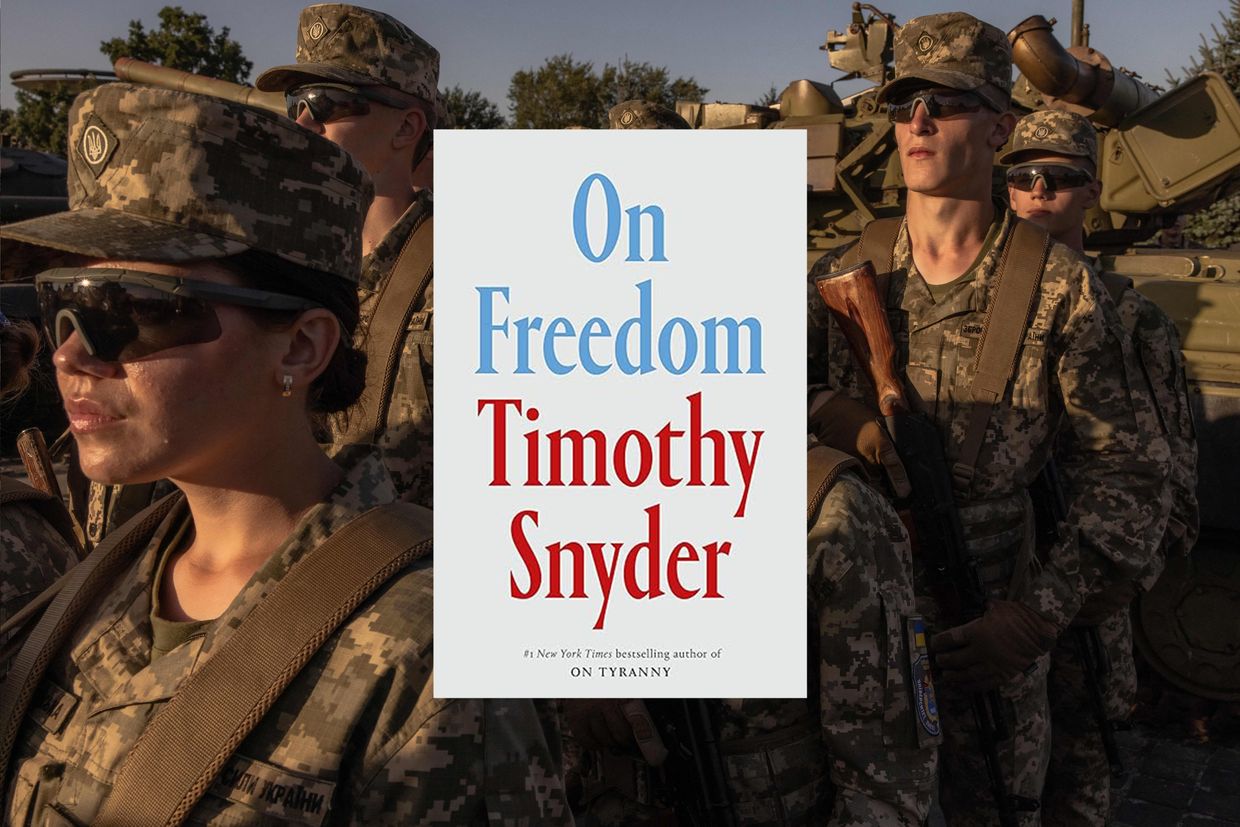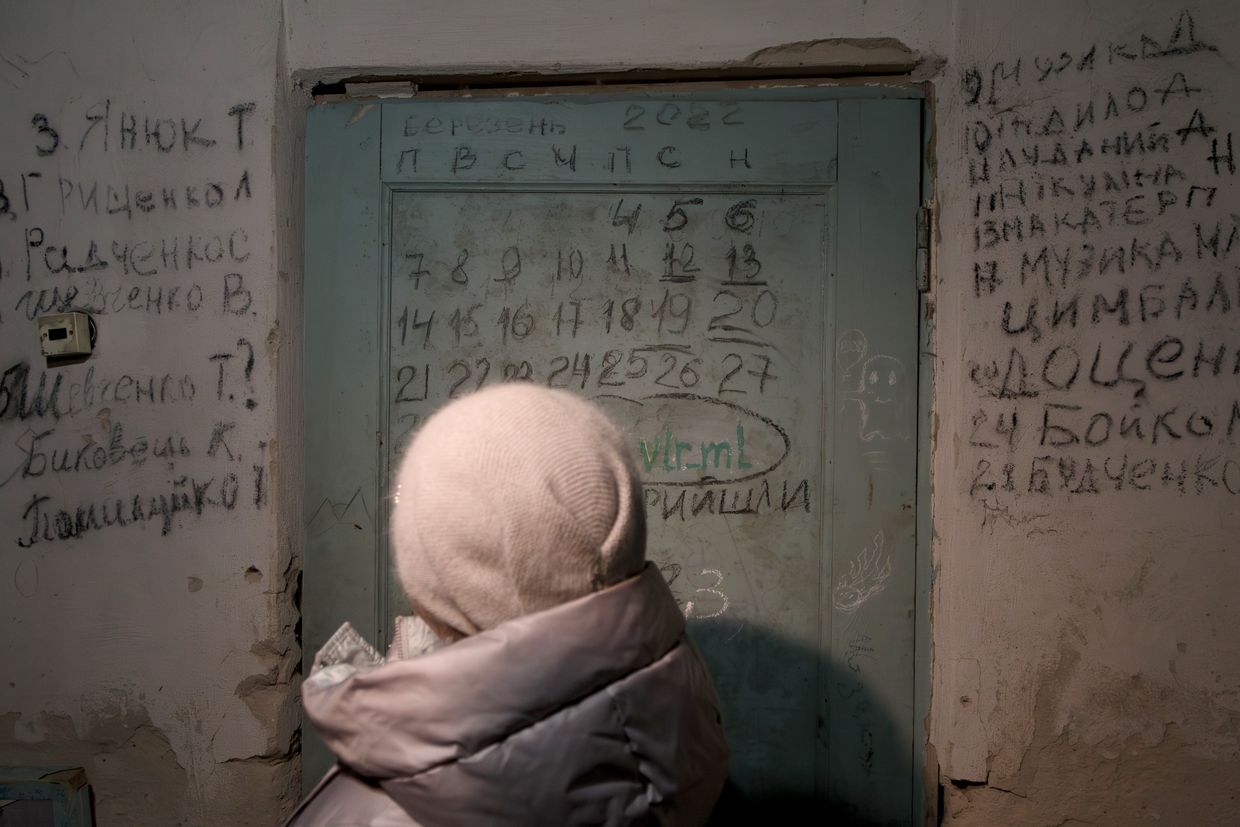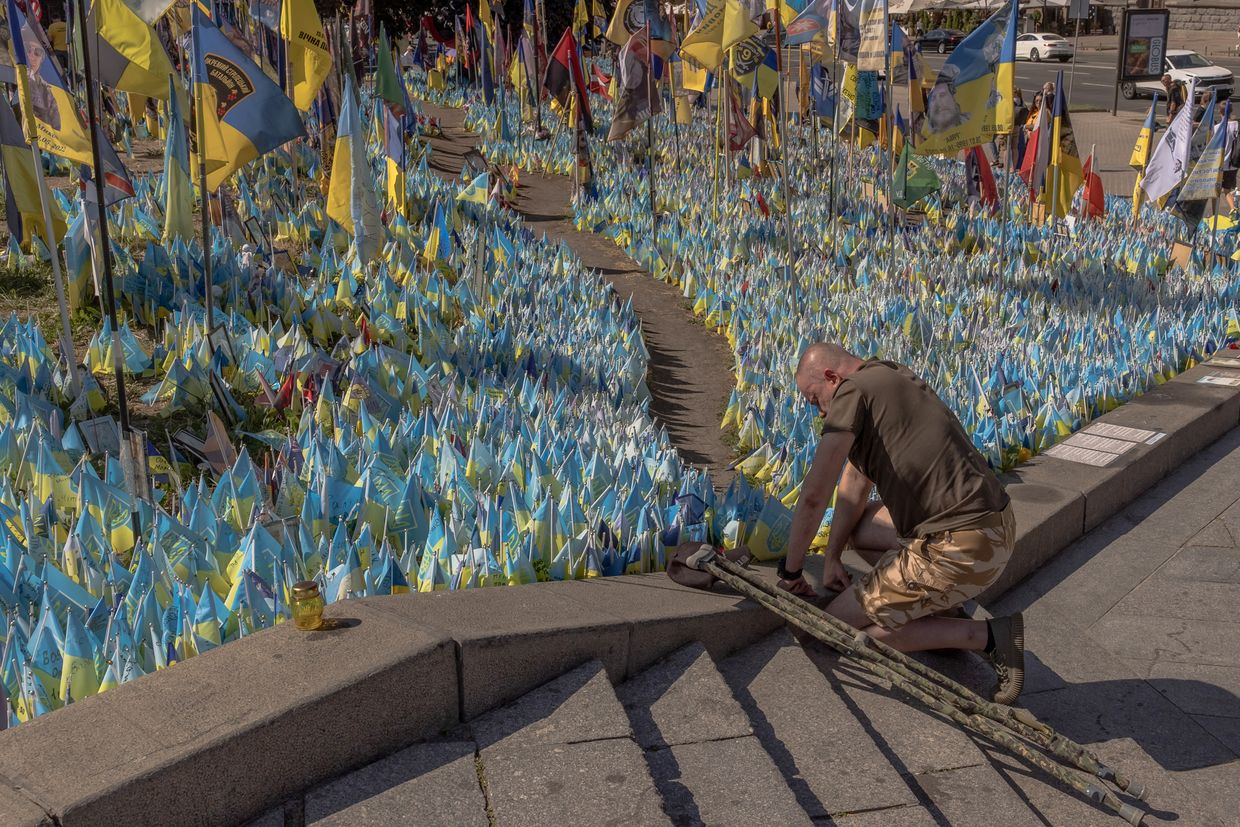
In his newest e-book, “On Freedom,” American scholar Timothy Snyder establishes a thought-provoking distinction between the phrase "liberation" and the Ukrainian wartime variant "de-occupation" to probe the fraught however crucial query: When is an individual really free?
Russia's full-scale battle in opposition to Ukraine has left numerous settlements in ruins and displaced thousands and thousands. Those that have fled face the uncertainty of carrying on with their lives elsewhere, whereas these returning to areas liberated by Ukrainian forces, if potential, should rebuild.
Snyder describes visiting the village of Yahidne in Ukraine’s northeastern Chernihiv Oblast, the place through the occupation, Russian troopers compelled practically the whole village — greater than 360 individuals — into the college basement at gunpoint. The locals would spend a month there, in inhumane circumstances, used as human shields for the Russian troopers’ headquarters upstairs. Eleven of them wouldn’t make it out alive.
“A liberation suggests {that a} woe has dissipated,” Snyder writes. “However the adults want help, the youngsters a brand new faculty. It’s so crucial that (the village) is now not occupied. However it could be incorrect to finish the story of Yahidne when the survivors emerged from underground.”
Snyder’s considerations are legitimate — though practically three years have handed for the reason that occupation of Yahidne, Ukrainian journalists have reported on ongoing scandals surrounding the reconstruction of the village that got here to be one of many many settlements symbolizing the horrors of Russian aggression.
Whereas “On Freedom” primarily focuses on the USA, Snyder’s reflections on Ukraine, enriched by his experience as a historian of European historical past and notably that of the previous Soviet Union, make the e-book a compelling learn for a broad viewers, providing each a stark warning and a much-needed declaration of ethical readability in an period more and more outlined by rising authoritarianism.
There’s, in the beginning, a necessity, as Snyder argues, to rescue the phrase freedom from “overuse and abuse.” Defining what drives freedom is essential to understanding the true extent of it. On this context, the comparability Snyder finally attracts between nations just like the U.S. and Ukraine is placing.
Snyder means that we are able to conceive of freedom in two methods: as freedom from one thing or as freedom to do one thing. The previous, the cornerstone of American id — initially freedom from British tyranny — presents a imaginative and prescient many People imagine is assured by birthright. It’s what he additionally calls “unfavorable freedom:” the absence of occupation, oppression, and even authorities.
Snyder means that we are able to conceive of freedom in two methods: as freedom from one thing or as freedom to do one thing.
But, Snyder warns, this perception in freedom from one thing is susceptible to malevolent distortion. These in energy can simply mislead the general public into forfeiting their rights by disguising the act as a safeguard in opposition to each tangible and perceived threats, such because the expanded surveillance talents of legislation enforcement after the 9/11 terrorist assaults throughout U.S. President George W. Bush’s administration.

Snyder contends that symbols just like the American flag, seen as emblems of freedom, can generally additionally substitute for the precise follow of it. Historical past provides many cases the place the freedoms these symbols characterize excluded sure teams, with racial inequality within the U.S. serving as a recurring instance all through the e-book. True freedom, Snyder argues, is just not rooted in endlessly glorifying previous achievements however within the braveness to confront what should be carried out to uphold and increase freedom for all. As he aptly states, “reward is just not follow.”
“It’s simple to think about that freedom can be delivered to us by a tune, by jets over a stadium, by the land, by the ancestors, by the Founders, by capitalism,” he continues. “However is the notion that we’re granted freedom proper for a ‘residence of the courageous’?”
“Is it no more brave to ask what People have carried out, might have carried out, ought to do?”
The Chilly Warfare provides us a telling instance. As Snyder notes, it was a “ethical problem” for the U.S. — Senator Joseph McCarthy launched a witch hunt for communist affect within the nation, destroying many harmless individuals’s lives and careers with baseless accusations. The U.S. authorities additionally supported right-wing dictatorships in Latin America to suppress even reasonable socialist actions.
On the similar time, ”the Soviet problem had additionally pushed America towards some strengths,” together with a manned mission to the moon, substantial investments in training, and the promotion of cultural diplomacy overseas. Whereas not with out flaws, U.S. coverage through the Chilly Warfare demonstrated a dedication to investing in its inhabitants and defending it by strong buildings. This strategy helped to underscore the perceived superiority of the American mannequin over that of the united states.
“Whether or not we can be free will rely upon us,” as Snyder writes. “Not simply on what we do, however on why we do it: our beliefs.”
“Whether or not we can be free will rely upon us,” as Snyder writes. “Not simply on what we do, however on why we do it: our beliefs.”
The genocidal nature of Russia's battle in opposition to Ukraine — marked by the deliberate destruction of cultural websites and the compelled relocation of tens of hundreds of Ukrainian youngsters — may need some assume that Ukraine's wrestle is just the struggle for freedom from Russia. But, the Ukrainians that Snyder speaks with throughout his visits to the wartime nation inform him about freedom in a essentially totally different approach than People understand it. Their viewpoint aligns with most different nations, to be extra exact — and that is what makes all of them happier, more healthy, and finally extra nicely off.
For Ukrainians, the battle is just not framed as solely a struggle for freedom from Russia however relatively in regards to the freedom to stay on their very own phrases. This imaginative and prescient of freedom is one rooted in self-determination, the place Ukrainians attempt for autonomy and the fitting to form their very own future with out Russian interference or domination.
“The occupiers had gotten in the best way of a way that the world was opening up (for Ukrainians), that the following era would have a greater life, that selections made now would matter in years to return,” Snyder writes.

“A soldier in a rehabilitation heart instructed me that freedom was about everybody having an opportunity to meet their very own functions after the battle. A veteran awaiting a prosthesis mentioned that freedom can be a smile on his son’s face. A younger soldier on go away mentioned that freedom was in regards to the youngsters he wish to have.”
Snyder additionally explores how entry to data and an openness to have interaction meaningfully with the world round us are integral to a free society — beliefs that nations like Russia actively search to undermine. He highlights how Ukraine has needed to confront Russia’s makes an attempt to control international perceptions of the battle by contradictory narratives, resembling claims that the Ukrainian language is “not actual” whereas additionally alleging that Ukrainians are “compelled” to talk it over Russian, or the paradoxical assertions that Ukraine is a rustic of Nazis but additionally one which promotes LGBTQ+ values and is concerned in some form of Jewish conspiracy.
As Snyder writes, “the easy proven fact that Russia had invaded a neighboring nation acquired misplaced on social media,” with on-line platforms turning into battlegrounds for narratives debating whether or not the invasion was “justified.” He critiques this distraction, noting, “People and others wasted outrage on phantoms whilst an actual battle of aggression started.”
Studying Snyder's "On Freedom" evokes an much more somber undertone within the aftermath of Donald Trump's 2024 presidential victory within the U.S., which was marked by his repeated assertions that there "wouldn't be a rustic anymore" if he misplaced — a mantra designed to incite concern amongst his base and sway undecided voters. Whereas conservative pundits tout the "future appears to be like vivid" for the nation, others voice rising considerations over potential erosions of freedoms, together with minority rights and ladies's well being, given the declarations Trump and his allies made on the marketing campaign path.
Concurrently, Russia seems emboldened amid uncertainty over the way forward for U.S. army support for Kyiv, escalating aerial assaults throughout the nation and intensifying efforts to occupy extra territory in Ukraine’s east. Ukrainian officers additionally face mounting strain to agree on negotiations for a ceasefire, all whereas recognizing that Moscow’s final objective of exterminating the Ukrainian nationwide concept stays unchanged.
The prospects for 2025 and past could seem grim, but Snyder encourages readers to stay steadfast and resolute: “Worry is just not sufficient. It is not going to get us the place we have to go. From essentially the most fundamental information we are able to construct a scaffolding of hope.”
By grounding ourselves in elementary ethical truths relatively than intoxicating ourselves with harmful rhetoric, we are able to start to assemble not simply resistance in opposition to authoritarian forces however a framework of hope and substantive motion to raised the world. Partaking with generally uncomfortable inquiries about oneself, one’s neighborhood, and one's nation is just not merely an mental train however a necessity for real readability and self-awareness. This act of reclaiming company — selecting hope over concern — is itself a vital step towards safeguarding freedom.
Notice from the writer:
Hello, that is Kate Tsurkan, thanks for studying this text. There’s an ever-increasing quantity of books about or associated to Ukraine obtainable to English-language readers, and I hope my suggestions show helpful relating to your subsequent journey to the bookstore. Ukrainian tradition has taken on an much more vital that means throughout wartime, so when you like studying about this form of factor, please consider supporting The Kyiv Independent.
Keep heat with Ukrainian traditions this winter. Store our seasonal merch assortment.